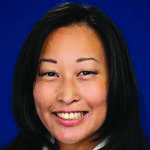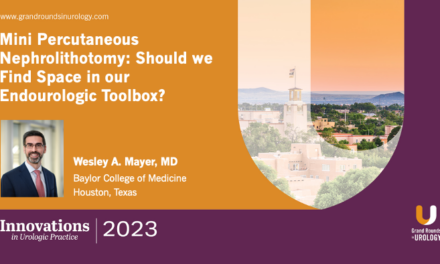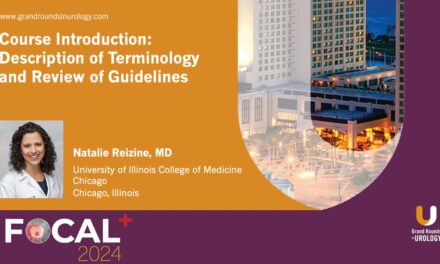Helena Chang, MD, presented “Office-Based Removal Of Small Stones Ultrasonic Propulsion & Burst Wave Lithotripsy New Technologies In Endourology” during the 31st Annual Perspectives in Urology: Point-Counterpoint, on October 18, 2024, in Scottsdale, Arizona.
How to cite: Chang, Helena. “Office-Based Removal Of Small Stones Ultrasonic Propulsion & Burst Wave Lithotripsy New Technologies In Endourology.” October 18, 2024. Accessed May 2025. https://grandroundsinurology.com/office-based-removal-of-small-stones-ultrasonic-propulsion-burst-wave-lithotripsy-new-technologies-in-endouroloby/
Office-Based Removal Of Small Stones Ultrasonic Propulsion & Burst Wave Lithotripsy New Technologies In Endourology – Summary
Helena Chang, MD, explores noninvasive technologies for kidney stone management, including ultrasonic propulsion and burst wave lithotripsy (BWL). In this 12-minute presentation, she looks at emerging modalities that use focused ultrasound to reposition or fragment stones transcutaneously in awake patients, offering an alternative to traditional surgical methods. Dr. Chang highlights the differences between BWL and conventional shockwave lithotripsy, emphasizing the tailored application of ultrasound bursts for effective stone treatment without anesthesia.
Early clinical trials demonstrate promising outcomes. Ultrasonic propulsion reduces relapse rates by repositioning small residual stones. The techniques are minimally invasive, well-tolerated, and suitable for clinic-based use, though challenges like acoustic windows, probe handling, and treatment duration remain. Dr. Chang underscores the need for further trials and FDA approval to optimize implementation in clinical settings.
Potential applications extend to fluoroscopy-free treatment for pediatric patients and emergency care. With compact devices and real-time visualization capabilities, these innovations represent a significant leap in kidney stone management, offering safer and more accessible treatment options.
About the 31st Annual Perspectives in Urology: Point Counterpoint conference: Presented by Program Chair and Grand Rounds in Urology Editor-in-Chief E. David Crawford, MD, this conference brought together leading experts in urology, medical oncology, and radiation oncology to discuss and debate the latest topics in genitourinary cancers, primarily prostate cancer and bladder cancer. This interactive conference offered topical lectures, pro/con debates, interesting-case presentations, interactive panel discussions, and interactive audience and faculty networking.
ABOUT THE AUTHOR
Helena Chang, MD, is a Professor in the Surgery Department, Director, Revlon/UCLA Breast Center, and is a member of Signal Transduction and Therapeutics, at the Ronald Reagan UCLA Medical Center in Santa Clara, California. Dr. Chang specializes in Cancer and Surgical Oncology.
Dr. Chang earned undergraduate degrees at Stanford University in biological sciences and international relations. Before going on to medical school, she worked to influence policies that improve access to health care in Washington, D.C. Dr. Chang earned her medical degree at the University of Wisconsin School of Medicine and Public Health in Madison, Wisconsin. She then completed a residency in urology at the University of California, San Francisco. Dr. Chang went on to complete a fellowship in endourology and minimally invasive surgery at the University of Washington in Seattle, Washington.
Dr. Helena Chang's long-term research interest is in the development of immunotherapy in treating adult ductal epithelial cancer. Chang has developed several recombinant live vaccines that actively secrete a tumor antigen and human cytokines. The role of these vaccines in human cancer treatment and prevention is being investigated. The biological activity of the targeted tumor antigen (MUC-1 peptide) and its involvement in cancer invasion and metastases is being characterized by her research team. She is also working closely with clinician-scientists and basic researchers.





